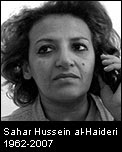Iraqi Reporter Latest Victim of Violence Against Women Journalists
(07-Jun-07)
A courageous Iraqi journalist, who covered sectarian violence in the north of the country, has been murdered in Mosul, the latest victim of attacks against Muslim women reporters.
Sahar Hussein al-Haideri, 45, a top Iraqi reporter working in the perilous Mosul region, who fearlessly wrote about efforts by extremist forces to take control of the city and foment sectarian conflict, was murdered outside her home on June 7.
Haideri reported for a Mosul newspaper, the Voices of Iraq news agency, and the Institute for War & Peace Reporting, IWPR, where she had participated in numerous training and exchange programmes over the past three years.
Her most recent story was a moving feature on the stoning to death of a young Yezidi girl who had converted to Islam after falling in love with a Muslim boy. See “Honour Killing” Sparks Fears of New Iraqi Conflict.
Haideri had long been concerned about her security, and for the past year had contributed reports to IWPR under a pseudonym. Six months ago, her husband and four children moved to Damascus, and she had recently relocated to Syria herself.
She was on a brief visit back to her home in Mosul. Several individuals confronted her as she left her house on June 7 and shot her dead.
Read it here.
“Honour Killing” Sparks Fears of New Iraqi Conflict
By Sahar Al-Haideri in Iraq (ICR No. 221, 14-May-07)
The Yezidi minority has so far stayed well out of Iraq’s internecine battles, but violence with their Muslim neighbours has escalated following the murder of a girl who apparently converted to Islam.
Bashiqa, a small town sitting in lush green hills east of the city of Mosul, used to be regarded as an island of peace and stability while vast areas of post-Saddam Iraq were plunged into civil war.
Home to a population that is 70 per cent Yezidi – members of an old sect that is neither Muslim nor Christian – Bashiqa was spared the sectarian and ethnic strife between Arabs and Kurds, radical Sunnis and Shia that plagued surrounding areas. People from Mosul would drive the 25 kilometres to Bashiqa to have picnics and to enjoy the tranquility of a little town where Yezidi temples, Muslim mosques and Christian churches stand in close proximity, presenting a rare image of tolerant coexistence.
Until April 7, that is. On that day, a furious mob stoned a 17-year-old girl to death while bystanders applauded and filmed the killing on their cell phones.
Her crime? Duaa Khalil Aswad, a Yezidi, had run away from home because she had fallen in love with a Muslim boy. It was not the first love story of its kind, nor was it the first “honour killing” in a region where women are subject to strong social restrictions and face severe punishment for disregarding family, tribal or religious traditions.
Such cases can no longer be covered up as easily these days, because of pressure from local women’s activists – but they rarely cause a stir.
Duaa’s case was different. This killing has had much wider impact – unleashing widespread inter-communal strife in a formerly peaceful area, which has resulted in at least 20 deaths and the threat of more violence.
In addition to fears of a new ongoing conflict between Yezidis and Muslims, the case highlights the absence of rule of law, and the acceptance that family disputes should be dealt with by relatives rather than outsiders from the judiciary, even when the resolution involves murder. At least one eyewitness said members of the security forces stood by and did not intervene as Duaa was stoned to death.
Read all of it here.


















